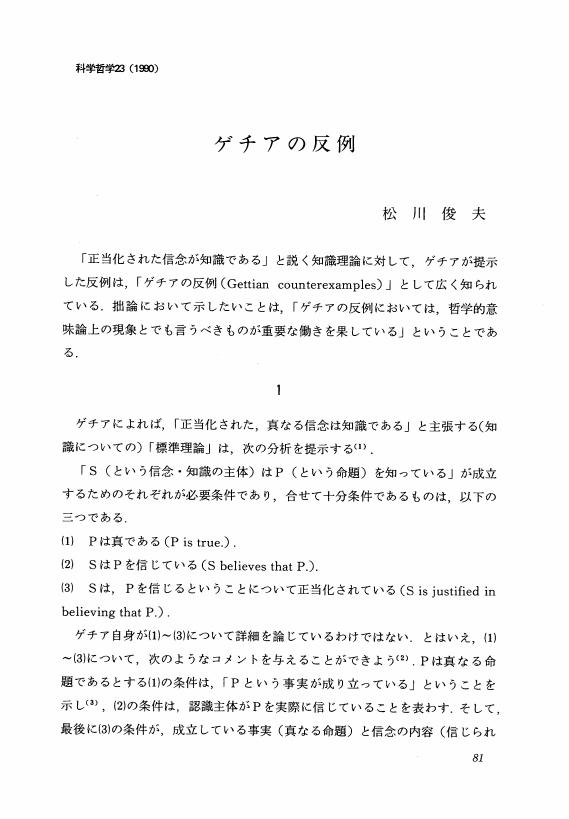1 0 0 0 OA メディア暴力の倫理学(X) : メディア暴力と哲学的行為論
- 著者
- 松川 俊夫
- 出版者
- 東北文教大学・東北文教大学短期大学部
- 雑誌
- 東北文教大学・東北文教大学短期大学部紀要 = Bulletin of Tohoku Bunkyo College Tohoku Bunkyo Junior College
- 巻号頁・発行日
- vol.3, pp.65-72, 2013-03-31
1 0 0 0 OA "Ethics" of Applied Ethics or "Applied" of Applied Ethics : 応用倫理学の基底となる倫理学とは?(第57回大会研究発表要旨)
- 著者
- 松川 俊夫
- 出版者
- 東北哲学会
- 雑誌
- 東北哲学会年報 (ISSN:09139354)
- 巻号頁・発行日
- vol.24, pp.95, 2008-04-25 (Released:2018-02-28)
1 0 0 0 OA 不完全義務と医師-患者関係
- 著者
- 松川 俊夫
- 出版者
- 日本医学哲学・倫理学会
- 雑誌
- 医学哲学 医学倫理 (ISSN:02896427)
- 巻号頁・発行日
- vol.20, pp.56-66, 2002-11-10 (Released:2018-02-01)
The concept of 'imperfect duty (or right)' is forgotten in modern ethics. But this concept is very efficient for medical ethics. For example, if we examine the duties of a physician and the rights of a patient by giving our eyes to imperfect duties and rights, we can get a clue to the fine understanding of the physician-patient relationship. Now that paternalism in the physician-patient relationship is said to be rejected, the autonomy of the patient is a kind of trump card. And many bioethicists and laymen adjudge that the physician-patient relationship must base itself on the 'contract.' But Japanese 'SEKEN1 ('the world' or the traditional Japanese human relationship) between a physician and a patient postulates one sort of physician's paternalism. And the physician-patient relationship based on a contract would bring some moral hazard to a physician. We must understand what is the moral problem in the physician-patient relationship, and the examination of imperfect duties (and rights) will lead us to the solution of that. In many respects, we follow the study of the history of ideas on the imperfect duty in Millard Schumaker's "Sharing without Reckoning."
1 0 0 0 OA 動物実験論争の哲学的含意
- 著者
- 松川 俊夫
- 出版者
- 日本医学哲学・倫理学会
- 雑誌
- 医学哲学 医学倫理 (ISSN:02896427)
- 巻号頁・発行日
- vol.12, pp.15-27, 1994-10-01 (Released:2018-02-01)
Why can we use animals for scientific experiments? Why can kill innocent animals to improve our life? Are human beings 'more equal' than the other animals? Those are very serious questions. The case for / against animal researches has many implications, which invite us to philosophical and ethical thinking. This paper examine these items. (1) Utilitarian and Kantian view on the moral status of animals. (2) Environmental ethics and bioethics on animal researches. (3) Reconsidering our system of rights and duties concerning animals. It is clear that the concept of 'person' plays an important role in the case for / against animal right. We must try to specify the reason why animals are not persons. One sort of 'speciesism' is proposed. This paper concludes as follows: to solve the difficult problems about experimented research animals, we must face the question of the ontology of life. Applied ethics always lead to metaphysics.
1 0 0 0 OA ゲチアの反例
- 著者
- 松川 俊夫
- 出版者
- 日本科学哲学会
- 雑誌
- 科学哲学 (ISSN:02893428)
- 巻号頁・発行日
- vol.23, pp.81-92, 1990-11-10 (Released:2009-05-29)
1 0 0 0 OA DeSe態度
- 著者
- 松川 俊夫
- 出版者
- 日本科学哲学会
- 雑誌
- 科学哲学 (ISSN:02893428)
- 巻号頁・発行日
- vol.20, pp.113-124, 1987-11-05 (Released:2009-05-29)


